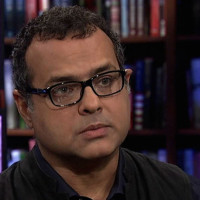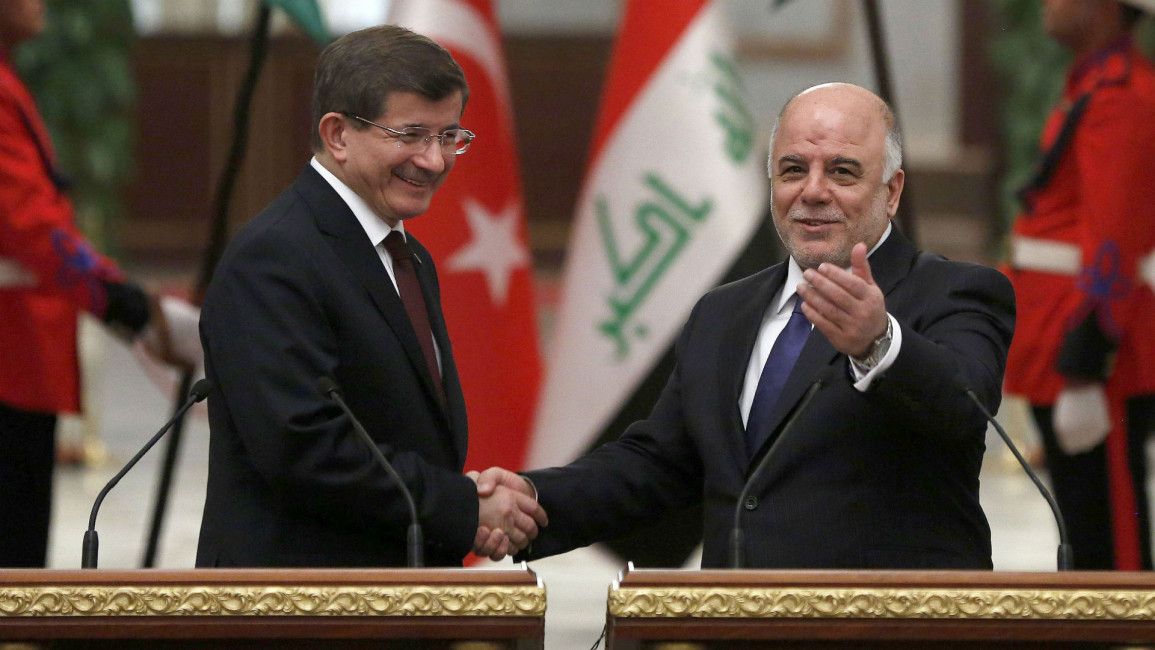
A new dawn for cooperation?
On November 20, the Turkish prime minister Ahmet Davutoglu arrived in Baghdad to meet his Iraqi counterpart Haider al-Abadi.
For all the tensions between Turkey and Iraq, and there are many, Ankara's economic interests in the region have expanded - its robust business relationship with Syria has fallen apart because of the civil war, but many of these links have shifted to Iraq.
Iraq imported $12 billion of Turkish goods last year, making it the second biggest market behind Germany. But trade has fallen due to the effect of the Islamic State's insurgency in the north - Turkish trucks continue to move through Sulaymaniyah, but with less confidence than before.
The importance of trade was clear in the news conference with the two leaders. Oil moves discretely from the autonomous Kurdish region of Iraqi into Turkey. Abadi said that this "Iraqi oil" must not be allowed to move without Baghdad having a role in the transaction. Tensions between the Kurds and Baghdad have increased around these issues.
Not just a business trip
But Davutoglu's visit was not merely about trade. It was also about the mayhem that besets the region. It was the first visit by a Turkish head of government in four years, making it the first since the start of the Syrian war.
| Davutoglu’s visit to Iraq should be seen as a sign that new opportunities are on the horizon. |
Does this signal recognition in Ankara of the isolation that has beset Turkey over the past several months? Should one see here the emergence of a new pragmatic regionalism to deal with the significant threat of the Islamic State group?
Such pragmatic regionalism is not new. Two years ago, I covered the Cairo and New York meetings of the Syria Contact Group, which was formed by Egypt, Iran, Turkey and Saudi Arabia to stem the effects of the Syrian war.
The foreign ministers of Egypt, Iran and Turkey met in Cairo to formulate the group, but did so in private. The Iranian foreign minister, Ali Akbar Salehi, said: “The things that we agree on are greater than our differences.”
Davutoglu, the then-Turkish foreign minister agreed. He stated that the enormity of the Syrian crisis brought a need for "regional ownership of the issues of our region".
A nine-point plan was formulated, including the suggestion that the group send observers to Syria, that a ceasefire be maintained and that confidence building measures be set up between the conflict's various parties.
The plan was never formally released however, as there remained many contentious issues, including an Iranian proposal to include Iraq in the group.
Saudi Arabia did not attend the group's first meeting, but kept a close eye on the proceedings.
An opportunity undermined
At the sidelines of the UN General Assembly in September 2012, the group met again.
Before leaving for New York, the then-Egyptian president Mohamed Morsi told Egyptian television: "I don’t see the presence of Iran in the Syrian Contact Group as a problem." His Iranian counterpart, Mahmoud Ahmadinejad, said Saudi Arabia's participation "would be great, it would be truly productive".
Saudi Arabia did indeed get involved and attended the New York meeting, and it appeared that a new regional road had opened. No one saw the contact group as a solution to the crisis; it was simply one more way to tackle Syria’s seemingly intractable problems.
Before the group could get going however, the United States and Russia decided to sideline it, and move the discussion to Spain for bilateral talks on Syria.
The message was that only the US and Russia had the authority to set the agenda for Syria. Not even the Syrians. The contract group folded not long after, suffocated by this Cold War attitude and the problems among the members.
It is premature to assume that something like the contact group can be restarted. But Davutoglu’s visit to Iraq should be seen as a sign that new opportunities are on the horizon.
The regional actors are indicating that the status quo is dangerous. Compromises will be necessary. Agendas will have to be forestalled. Rhetoric has to be softened. The US and Russia continue to be major players in the region, but the region itself has to take charge of its affairs. It cannot afford to remain the chess board of other people’s ambitions.




